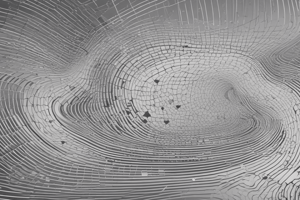Podcast
Questions and Answers
What is a characteristic of a vector quantity?
What is a characteristic of a vector quantity?
- It has only magnitude
- It is a scalar
- It has both magnitude and direction (correct)
- It has no direction
What is the result of adding two or more vectors?
What is the result of adding two or more vectors?
- A unit vector
- A scalar quantity
- A new vector (correct)
- A zero vector
What is the purpose of a unit vector?
What is the purpose of a unit vector?
- To specify orthogonal vectors
- To specify direction (correct)
- To specify parallel vectors
- To specify magnitude
What is the property of vector addition that states that the order of addition does not matter?
What is the property of vector addition that states that the order of addition does not matter?
What is the result of multiplying a vector by a scalar?
What is the result of multiplying a vector by a scalar?
What is the dot product of two orthogonal vectors?
What is the dot product of two orthogonal vectors?
What is the application of vectors in physics?
What is the application of vectors in physics?
What is the term for two vectors that are scalar multiples of each other?
What is the term for two vectors that are scalar multiples of each other?
Flashcards are hidden until you start studying
Study Notes
Definition of a Vector
- A vector is a quantity with both magnitude (length) and direction
- It is often represented graphically as an arrow in a coordinate plane
- Vectors are used to represent physical quantities with both size and direction, such as displacement, velocity, acceleration, and force
Types of Vectors
- Scalar: a quantity with only magnitude, no direction
- Vector: a quantity with both magnitude and direction
- Unit Vector: a vector with a magnitude of 1, used to specify direction
- Zero Vector: a vector with a magnitude of 0, used to represent no movement or force
Vector Operations
- Vector Addition: the sum of two or more vectors, resulting in a new vector
- Commutative property:
a + b = b + a - Associative property:
(a + b) + c = a + (b + c)
- Commutative property:
- Scalar Multiplication: multiplying a vector by a scalar (number), resulting in a new vector
k * a = ka(wherekis a scalar andais a vector)
- Vector Subtraction: the difference between two vectors, resulting in a new vector
a - b = a + (-b)
Vector Properties
- Magnitude (Length): the size or length of a vector, often represented as
|a| - Direction: the direction in which a vector points, often represented as
θ(theta) - Unit Vector: a vector with a magnitude of 1, used to specify direction
- Orthogonality: two vectors are orthogonal (perpendicular) if their dot product is 0
- Parallel: two vectors are parallel if one is a scalar multiple of the other
Vector Applications
- Physics: vectors are used to represent displacement, velocity, acceleration, and force
- Engineering: vectors are used to represent stresses, strains, and motion in structures and machines
- Computer Science: vectors are used in computer graphics, game development, and machine learning algorithms
Definition of a Vector
- A vector is a quantity with both magnitude (length) and direction.
- Graphical representation: an arrow in a coordinate plane.
- Used to represent physical quantities with size and direction, such as displacement, velocity, acceleration, and force.
Types of Vectors
- Scalar: quantity with only magnitude, no direction.
- Vector: quantity with both magnitude and direction.
- Unit Vector: vector with a magnitude of 1, used to specify direction.
- Zero Vector: vector with a magnitude of 0, represents no movement or force.
Vector Operations
- Vector Addition: sum of two or more vectors, resulting in a new vector.
- Properties of vector addition: commutative (a + b = b + a) and associative ((a + b) + c = a + (b + c)).
- Scalar Multiplication: multiplying a vector by a scalar (number), resulting in a new vector.
- Vector Subtraction: difference between two vectors, resulting in a new vector.
- Subtraction property: a - b = a + (-b).
Vector Properties
- Magnitude (Length): size or length of a vector, often represented as |a|.
- Direction: direction in which a vector points, often represented as θ (theta).
- Unit Vector: vector with a magnitude of 1, used to specify direction.
- Orthogonality: two vectors are orthogonal (perpendicular) if their dot product is 0.
- Parallel: two vectors are parallel if one is a scalar multiple of the other.
Vector Applications
- Physics: vectors represent displacement, velocity, acceleration, and force.
- Engineering: vectors represent stresses, strains, and motion in structures and machines.
- Computer Science: vectors used in computer graphics, game development, and machine learning algorithms.
Studying That Suits You
Use AI to generate personalized quizzes and flashcards to suit your learning preferences.




